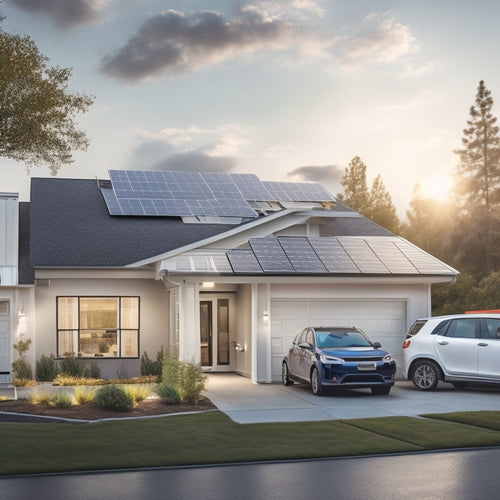
Are Solar Panels a Smart Investment for Homeowners
Share
By installing solar panels, you can recoup your initial investment in approximately 5-7 years and enjoy long-term savings of up to $30,000 over 25 years, making them a smart investment for homeowners seeking to reduce their energy bills and carbon footprint. With government incentives and financing options available, the upfront costs can be greatly lowered. Additionally, solar panels can increase your property value by up to 17% and provide a potential return on investment through increased resale value. As you examine the benefits of solar energy further, you'll uncover how it can optimize your energy savings, enhance your property's appeal, and contribute to a more sustainable future.
Key Takeaways
- Solar panels can increase property value by up to 17% and provide a return on investment through increased resale potential.
- With a typical payback period of 5-7 years, solar panels can pay for themselves through long-term energy savings, totaling up to $30,000 over 25 years.
- Government incentives, such as a 30% federal tax credit, and varying state rebates can significantly lower initial installation costs.
- Solar panels can reduce energy bills by up to 50%, resulting in annual savings ranging from $400 to $1,000 on utility bills.
- As energy independence and environmental concerns grow, solar panels can be a smart investment for homeowners seeking to future-proof their property.
Understanding Solar Panel Costs
When pondering a solar panel system for your home, understanding the costs involved is essential to determining whether this investment makes sense for you. The upfront installation expenses are a considerable factor, with the average cost ranging from $15,000 to $30,000, depending on the system size and quality.
However, various financing options can help make solar panels more accessible. You can choose to pay cash upfront, or investigate loan options with terms ranging from 5 to 20 years. Additionally, many governments and utilities offer incentives, such as tax credits and rebates, which can greatly reduce the initial cost.
It's also important to reflect on the long-term savings, as solar panels can reduce your energy bills by up to 50%. With the right financing and incentives, the initial investment can pay for itself in as little as 5-7 years.
Environmental Benefits of Solar
By investing in solar panels, you're taking a significant step towards reducing your carbon footprint, which is a major contributor to climate change.
You'll be utilizing a clean energy source that produces no emissions or pollution, making it a much more environmentally friendly option compared to traditional fossil fuels.
Additionally, you'll be helping to preserve natural resources for future generations by reducing your reliance on finite energy sources.
Reduce Carbon Footprint
Utilizing solar energy reduces your reliance on fossil fuels, slashing greenhouse gas emissions and mitigating climate change. By investing in solar panels, you're taking a significant step towards sustainable living and minimizing your carbon footprint.
Every kilowatt-hour of electricity generated from solar energy is a kilowatt-hour that doesn't come from burning fossil fuels, resulting in a substantial carbon offset.
According to the National Renewable Energy Laboratory, a typical residential solar panel system can reduce CO2 emissions by 3 to 4 tons per year. This is equivalent to planting over 100 trees annually.
By going solar, you're not only reducing your own carbon footprint but also contributing to a cleaner environment for future generations.
Solar energy is a clean and renewable source of power that reduces your dependence on fossil fuels, resulting in a significant decrease in greenhouse gas emissions.
Clean Energy Source
One of the most significant advantages of solar energy is that it's a clean and renewable source of power, generating electricity without producing any emissions or pollution. As you consider investing in solar panels, you'll be tapping into a clean energy source that doesn't contribute to climate change or air pollution.
This is particularly important, given the growing concerns about the environmental impact of traditional fossil fuels.
Solar energy trends indicate a significant shift towards renewable energy sources, with solar power capacity increasing by over 20% in 2020 alone. As renewable energy advancements continue to improve efficiency and reduce costs, solar energy is becoming an increasingly viable option for homeowners.
By investing in solar panels, you'll be at the forefront of this trend, reducing your reliance on fossil fuels and contributing to a cleaner, more sustainable energy future.
With solar energy, you can feel confident that you're doing your part to reduce your environmental footprint while also powering your home with clean, renewable energy.
Preserve Natural Resources
As you employ the power of solar energy, you're not only reducing your carbon footprint but also preserving natural resources for future generations. By capturing the sun's energy, you're decreasing your reliance on finite fossil fuels, which are the primary contributors to greenhouse gas emissions and climate change.
This shift towards renewable energy sources is essential for resource conservation and sustainable living.
Solar energy is a zero-emission source of power, producing no air or water pollution during operation. In contrast, traditional energy production methods release massive amounts of CO2, nitrogen oxides, and sulfur dioxide into the atmosphere, contributing to environmental degradation.
By choosing solar, you're actively reducing the strain on natural resources, conserving water, and mitigating the impact of climate change. According to the National Renewable Energy Laboratory, widespread adoption of solar energy could reduce CO2 emissions by up to 78 million metric tons annually in the United States alone.
Government Incentives and Rebates
Numerous government incentives and rebates are available to homeowners who invest in solar panels, making the shift to renewable energy more affordable. These incentives can greatly reduce the upfront cost of installing solar panels, making them a more attractive option for you.
Some of the most notable government incentives and rebates include:
| Incentive/Rebate | Description |
|---|---|
| Federal Incentives | 30% tax credit for solar panel installation |
| State Rebates | Varying rebates offered by individual states for solar panel installation |
| Performance-Based Incentives | Monetary incentives based on the performance of your solar panel system |
Additionally, you may be eligible for local programs, installation grants, and renewable energy certificates. Financing options, such as property assessed clean energy (PACE) financing, can also help you cover the cost of installation. Net metering policies allow you to generate your own electricity and export any excess back to the grid, reducing your energy bills. Community solar programs enable you to invest in a shared solar panel system, providing clean energy to your community.
Increasing Property Value
By installing solar panels, you can greatly enhance your home's resale value, making it more attractive to potential buyers.
In fact, studies have shown that solar panels can increase your property's value by up to 17%, which can translate to a substantial return on investment.
Additionally, solar panels can instantly enhance your home's curb appeal, increasing its asset worth and setting it apart from neighboring properties.
Boosting Home Resale Value
Enhancing Home Resale Value
Installing solar panels can considerably elevate your home's resale value, with a potential increase of up to 17% in property value, according to a study by the National Renewable Energy Laboratory.
This enhancement in value is largely driven by market trends and buyer preferences, as more homeowners prioritize energy efficiency and sustainability.
Here are some key benefits that contribute to this increased resale value:
-
Energy savings: Solar panels can save homeowners money on their energy bills, making their property more attractive to potential buyers.
-
Environmental appeal: With growing concerns about climate change, solar panels can be a major selling point for eco-conscious buyers.
-
Modern amenities: Solar panels can be seen as a modern, high-tech feature that sets your home apart from others in the neighborhood.
Enhancing Curb Appeal Instantly
Solar panels can instantly enhance your home's curb appeal, greatly contributing to an increase in property value.
By integrating solar panels into your home's design, you can elevate your property's visual impact, blending seamlessly with your neighborhood's appeal. Your personal style shines through with modern, sleek designs that complement your home's structural harmony.
Landscaping integration is made easy with color options that match your roof's tone, ensuring a cohesive look. Installation visibility is minimized, preserving your home's original charm.
As you join the modern trend of energy independence, your property becomes a standout in the neighborhood. With solar panels, you're not only generating clean energy but also enhancing your home's design aesthetics.
Increasing Asset Worth
Value appreciation is a key consideration for homeowners, and solar panels can markedly contribute to this goal. By installing solar panels, you're not only reducing your energy bills but also increasing your property's value. According to solar market trends, homes with solar panels sell for up to 17% more than those without.
Here are three ways solar panels can enhance your property's value:
-
Increased appeal: Solar panels are a desirable feature for many homebuyers, particularly environmentally conscious ones. They can be a major selling point, setting your property apart from others in the neighborhood.
-
Financial incentives: Governments and utility companies offer various financial incentives for homeowners who invest in solar panels. These incentives can be transferred to new homeowners, making your property more attractive to potential buyers.
-
Long-term savings: Solar panels can save homeowners thousands of dollars in energy costs over their lifespan. This long-term savings potential is a significant selling point, as it can offset the initial installation cost and provide a strong return on investment.
Energy Savings Over Time
Your utility bills serve as a constant reminder of the energy consumption habits of your household. By installing solar panels, you can greatly reduce your reliance on the grid and lower your energy expenses. Over time, these savings can add up, making a considerable impact on your financial planning.
As you generate your own energy, you'll notice a decrease in your electricity costs. According to the US Department of Energy, a typical American family can save between $400 and $1,000 per year on their utility bills by going solar. This translates to a notable reduction in your annual expenditures, freeing up more money for other important aspects of your life.
Moreover, as energy production increases, you'll be less susceptible to rising utility rates. With solar panels, you can lock in a fixed energy rate, providing a sense of stability in your financial planning.
Durability and Low Maintenance
One of the most significant advantages of solar panels is their exceptional durability, with a typical lifespan of 25 to 30 years or more. This means you can enjoy the benefits of solar energy for decades to come, with minimal maintenance and upkeep.
Here are three key factors that contribute to the durability and low maintenance of solar panels:
-
Weather resistance: Solar panels are designed to withstand harsh environmental conditions, including heavy rain, hail, and extreme temperatures.
-
Advanced material technology: High-quality solar panels are built with durable materials that can resist corrosion and degradation, guaranteeing peak performance over time.
-
Minimal cleaning frequency: Solar panels require very little maintenance, and cleaning is only necessary every 6-12 months to guarantee peak energy production.
With solar panels, you can expect low maintenance costs and a warranty coverage that typically ranges from 10 to 25 years.
Additionally, installation requirements are designed to guarantee a secure and reliable system that can withstand environmental exposure.
Plus, with minimal performance degradation over time, you can count on your solar panels to deliver consistent energy production.
And when it's time for system upgrades, you can rest easy that your investment will continue to pay off for years to come.
Solar Panel Efficiency Ratings
Solar panels' exceptional durability and low maintenance costs are matched by their impressive efficiency ratings, which indicate how well they convert sunlight into usable electricity. As you consider investing in solar panels, it's crucial to understand these ratings, which are typically measured by their power output per unit area.
The efficiency rating of a solar panel is usually expressed as a percentage, with higher ratings indicating better performance. For instance, a panel with a 20% efficiency rating can convert 20% of the sun's energy into electricity, while a 15% efficient panel can only convert 15%.
Thanks to rapid solar technology advancements, modern solar panels boast notably higher efficiency ratings than their predecessors. Top-tier panels can have efficiencies ranging from 22% to 24%, while budget-friendly options still offer respectable ratings around 18%.
When evaluating panel performance metrics, look for the maximum power output (watts) and the temperature coefficient, which indicates how well the panel performs in hot conditions. By understanding these metrics, you can make an informed decision about which solar panels will provide the most power for your investment.
Affect on Electricity Bills
How much can you expect to save on your electricity bills by investing in solar panels? The answer lies in the amount of electricity your solar panel system generates and the rate at which your utility company compensates you for that energy.
Here are three scenarios to illustrate the potential electricity savings:
-
Moderate Energy User: If you consume 500 kWh of electricity per month, solar panels can save you around $75 to $100 per month on your utility bills, depending on your location and the size of your solar panel system.
-
Average Energy User: With a monthly energy consumption of 750 kWh, you can expect to save around $112 to $150 per month on your electricity bills.
-
High Energy User: If you use 1,000 kWh of electricity per month, solar panels can save you around $150 to $200 per month on your utility bills.
Long-Term ROI and Payback
Your electricity bill savings are just the beginning of the financial benefits of solar panels. When you invest in solar, you're not just reducing your monthly expenses, you're also increasing your property value and generating long-term savings.
According to a study by the National Renewable Energy Laboratory, solar panels can increase your property value by up to $15,000.
In terms of investment analysis, solar panels typically have a payback period of 5-7 years, depending on your location and energy usage. After that, you'll start generating pure profit from your solar panels.
Over their 25-year lifespan, solar panels can save you up to $30,000 in electricity costs. That's a significant return on investment, especially considering the initial cost of installation has decreased by over 70% in the last decade.
With solar panels, you're fundamentally locking in a low electricity rate for the next quarter-century, shielding yourself from future rate hikes.
Frequently Asked Questions
Can I Install Solar Panels on a Rented Property?
You'll need to secure your landlord's permission before installing solar panels on a rented property, and consider negotiating a solar panel agreement that outlines responsibilities, costs, and benefits for both parties.
Do Solar Panels Work During Power Outages?
You'll find that solar panels alone won't provide power during outages, but with battery storage, you'll achieve energy independence, as the stored energy is released when the grid goes down, ensuring your home remains powered.
Are Solar Panels Resistant to Hail and Extreme Weather?
You're as protected as a turtle in its shell when it comes to hail damage, as solar panels are built to withstand extreme weather, with most manufacturers guaranteeing weather resilience against hail up to 1 inch in diameter at 50 mph.
Can I Sell Excess Energy Back to the Grid?
You can sell excess energy back to the grid through net metering benefits, where your utility company gives you credit for surplus power, and energy buyback programs, which allow you to monetize your excess energy production.
Do Solar Panels Require Periodic Cleaning?
You'll find frequent fogging and filthy façades foil your solar panel's productivity, so you'll need to scrub them seasonally, as sediment accumulation slashes energy output; cleaning frequency depends on your location's pollution and precipitation patterns.
Related Posts
-

What Electric Vehicle Owners Need for Home Energy
As an electric vehicle owner, you need to optimize your home energy system to guarantee efficient, sustainable, and c...
-

Why Invest in Residential Solar Panel Systems?
By investing in a residential solar panel system, you'll harness renewable energy, reducing your carbon footprint and...
-

Why Cities Need Smart Charging Infrastructure Now
You're about to experience a tidal wave of electric vehicles hitting your city's streets, and it's essential you're p...


